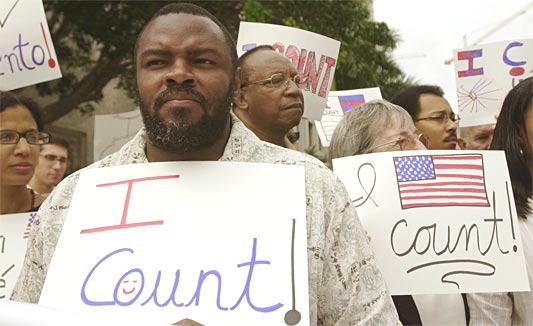Lawsuit Against Gov Scott and Clemency Board Seeks to Restore Former Felon's Voting Rights
Posted March 14, 2017 05:15 am
 TALLAHASSEE, FL –
A class action lawsuit seeks to automatically restore
former felons’ voting rights and eliminate Florida’s
arbitrary and opaque process for re-enfranchisement. The
lawsuit was filed by the national voting rights
organization, Fair Elections Legal Network, and law firm
Cohen Milstein Sellers & Toll PLLC on behalf of seven
former felons.
TALLAHASSEE, FL –
A class action lawsuit seeks to automatically restore
former felons’ voting rights and eliminate Florida’s
arbitrary and opaque process for re-enfranchisement. The
lawsuit was filed by the national voting rights
organization, Fair Elections Legal Network, and law firm
Cohen Milstein Sellers & Toll PLLC on behalf of seven
former felons.
Florida is one of four states that denies the right to vote to all former felons until they petition for rights restoration, and this process is the target of the lawsuit. 1.6 million Floridians are currently disenfranchised—the highest state total in the nation—and over 10,000 are waiting for a hearing on their restoration applications.
The lawsuit cites the lack of any rules governing the Executive Clemency Board’s decisions to grant or deny applications. Without any rules, the system and the applicants are prone to arbitrary treatment, violating the 1st and 14th Amendments to the U.S. Constitution, according to the lawsuit.
“Unlike the overwhelming majority of states, Florida simply has no law that tells ex-felons when their voting rights are restored. Instead, they must beg state officials to give them their rights back and this set-up violates our Constitution,” said Jon Sherman, Senior Counsel for the Fair Elections Legal Network. “The right to vote should be automatically restored to ex-felons at a specific point in time—the completion of a sentence—not whenever a politician decides you’ve earned it.”
Giving government officials unfettered discretion, according to the complaint, leads to unequal treatment of people in similar circumstances. During the last Executive Clemency Board hearing, Governor Rick Scott speaking of the process said, “Clemency is… is—there’s no standard. We can do whatever we want.”
The current voting rights restoration process requires former felons who have completed their full sentences to petition the Executive Clemency Board, which is comprised of the Governor, Attorney General, Chief Financial Officer and Commissioner of Agriculture. Once they have applied, they must wait an indeterminate amount of time to be placed on the Board’s quarterly meeting agenda. This can take as long as 10 years for some applicants or months for others. The lawsuit also challenges both the lack of any time limits for making decisions on restoration applications – another violation of the 1st Amendment – and the 5- and 7-year post-sentence waiting periods Governor Scott imposed.
Once an applicant is selected for a hearing, the Executive Clemency Board’s decision to accept or deny the restoration of voting rights is made through an arbitrary process, not regulated with any laws, rules or criteria. Some applicants, including some of the plaintiffs in this case, have had their applications rejected simply for receiving traffic citations after they finished their sentences.
“Our most precious right is the right to vote. Ex-felons should not be denied the opportunity to have their rights restored nor to participate in fair and free elections. Yet, the Florida Clemency Board’s obstruction of restoring voting rights runs counter to everything we as Americans stand for. This important class action lawsuit will fight to restore these citizens' right to vote,” stated Theodore Leopold, partner with Cohen Milstein Sellers & Toll.
About 1.6 million Floridians are disenfranchised because they were convicted of a felony and have not had their voting rights restored. This includes men and women of all different political parties, races, ethnicities, ages, from cities and rural areas, as well as veterans, small business owners and others.
• As of March 1, 2017, the backlog of applicants for voting rights restoration stood at 10,513, but the Clemency Board only hears an average of 52 cases per quarter. At this rate, if no new applications were submitted, it would take the Clemency Board almost 51 years to hear the entire backlog of applicants.
• The number of applications granted has dropped significantly since Governor Scott took office in 2011: from 2007-2011, 155,133 were granted, while only 2,488 applications have been granted since 2011.
Florida’s arbitrary rights restoration process violates the U.S. Constitution and hinders former felons from truly reentering society. To remedy this violation, the lawsuit seeks the automatic restoration of the rights of the plaintiffs and other former felons who have served their full sentences including parole and probation.
Image: MSNBC/AP

